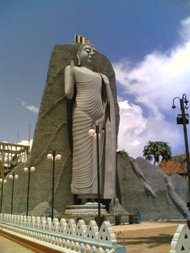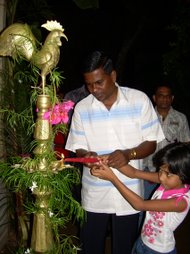Federal? What federal?
No sooner than news broke that the UNP was dropping its federal idea, party leader Ranil Wickremasinghe was flooded with phone calls. Despite phrasing their questions in diverse ways, all enquirers got a stock answer: “We always supported the devolution of power but we never mentioned the word ‘federal’. It was Chandrika who introduced this word ‘federal’. Subsequently, this government resurrected the word and used it to level allegations against us. But we never said ‘federal’. The last power sharing proposal that we put forward was rejected. Therefore, we are trying to put forward a new proposal. That’s all there is to it.”
It was Lakshman Kiriella who later reported to Ranil that TULF leader V Anandasangaree had publicly expressed shock at the UNP’s latest position on power sharing. “Why should we bother ourselves over something stated by a man who is not shocked that Mahinda Rajapaksa’s Government is killing Tamils?” replied Ranil.
Blood brothers
While President Mahinda Rajapaksa herded a delegation to New York to attend the UN General Assembly sessions, the UNP started an email protest against them by circulating an electronic letter titled ‘Blood Brothers’. The email contained, among other things, information about threats on Sunday Times Defence Correspondent Iqbal Athas, allegations about the MiG-27 deal and details of human rights violations in the country. It’s believed that this email made its way into many inboxes, including those of international leaders.
A close shave
As President Rajapaksa was readying to address the UN General Assembly on Wednesday, he received a telephone call from Human Rights Minister Mahinda Samarasinghe (who was in Geneva to attend sessions of the UN Human Rights Council). The Minister told him that an attempt to have a resolution passed against Sri Lanka in the Human Rights Council had been defeated. “Loku deyak,” responded the President. “I am very happy. I can now address the UNGA with confidence.” Campaigners had tried for two weeks to have the resolution passed at the Human Rights Council, even calling Sri Lanka a graveyard and submitting statistical and other data related to disappearances, abductions and killings. But Samarasinghe and his team maintained staunchly that much of their information was flawed. Later, Sri Lanka’s Office of the Permanent Representative to the UN insisted that a resolution had never been on the cards.
American PR advisors this time?
The People’s Campaign to Alleviate Public Suffering’ — a UNP effort to distribute propaganda leaflets at 400 weekly fairs — is now in full force. On September 22, Ranil Wickremasinghe was spied at the Negombo weekly fair, a sheaf of papers in hand. While he was giving out the leaflets, a man carrying a child in his arms approached him. “Sir,” he said, “I can no longer afford to buy milk powder for my child.” What did Ranil do next but hoist the child into his own arms (much like American Presidents often do)! Not that this helped bring down the price of milk powder but...
Later, Ranil was also approached by a woman who cried that the rising cost of living was unbearable and that she could not afford to eat. The Opposition Leader hurriedly looked around for his security officer, to get some money for the woman. Ever the handyman, Johnston Fernando quickly intervened - supplying a thousand rupee note for Ranil to gift the woman.
How are you?
Defence Secretary Gotabhaya Rajapaksa came face to face with Ranil Wickremasinghe at Chief Government Whip Jeyaraj Fernandopulle’s house. Both were there to pay their final respects to Fernandopulle’s mother, who had passed away. Fernandopulle quickly pulled Gotabhaya to the same sofa on which Ranil was seated. The Presidential brother, sporting a wide smile, put his hand out and asked the Opposition Leader: “How are you?” Without missing a beat, Ranil replied (also with a smile): “Making your life difficult.” Gotabhaya laughed. The pair had a brief conversation after which the Defence Secretary left.
Hot protest against Arbour’s visit
The National Patriotic Movement met in Borella on Wednesday, headed by Gunadasa Amarasekera. They debated heavily about the forthcoming visit of Louise Arbour, the UN High Commissioner for Human Rights. It was finally resolved that the NPM would pile onto the streets in protest against her arrival. The NPM’s Manel Mal Movement also met the same day under the auspices of Convenor, S L Gunasekera. They named 2008 as the Year for Defeating the LTTE by Strengthening the Armed Forces. They also decided to make sure that every soldier received a greeting card on 1 January 2008, offering them best wishes. Wimal Weerawansa, Gomin Daysiri and Upali Jayasekera also attended.
Just another UNP trick
The JVP Politburo met on Tuesday at their Battaramulla party headquarters, chaired by Somawansa Amarasinghe. During the meeting, they received information that Jeyaraj Fernandopulle’s mother’s funeral would be held the same afternoon. Consequently, they decided to limit their discussions to urgent matters so that they could attend the funeral.
The JVP first spoke about the two weeks of public meetings they had been holding. All of them agreed that they had been quite successful and resolved to organise many more in future.
Afterwards, they spoke about reports that the UNP had shed the federal idea. They shared the opinion that this was just another UNP trick. “This a complete sham,” held Vijitha Herath. “The UNP just wants to lose its federal label. They have absolutely no intention of giving up the concept. Not to leave the devolution of power.” “It’s one of their new conspiracies,” agreed Wimal Weerawansa. “This was obvious from both of the UNP’s rag sheet newspapers last weekend. There was nothing in those two papers supportive of us. So, it isn’t out of love for us that they are going down this path. We must be careful. The UNP is eyeing our 37 seats.”
Herath added: “Ravi Karunanayake has said the US Ambassador had come rushing to meet Ranil Wickremesinghe the moment the UNP made its announcement about shedding federalism. The US Ambassador went running there because the UNP is a buddy of the West. The UNP will never distance itself from the West. It’s the same with this federal story.” Somawansa pitched in that nobody takes Ranil seriously.
The Politburo then spoke about the forthcoming visit of Louise Arbour, the UN High Commissioner for Human Rights. “This woman is coming to Sri Lanka on the Government’s invitation. The Government still hasn’t learnt a lesson. They brought Allan Rock here. He gave misleading information to the world about Sri Lanka. Then they got down John Holmes. He said Sri Lanka is a very dangerous place and the Government called him a terrorist. There’s no sense in bringing people here and blackguarding them after they’ve left. They must have some foresight and not let them come here at all.”
Is it the 10% ?
The blue and red satakayas are wishing each other: Tikiri Kobbekaduwa Governor,Central Province, hands over an envelope to recently appointed National List MP Basil Rajapaksa during the Bandaranaike commemoration held last Wednesday (Sept 26) at the Horagolla Samadhi.
Pic by Sisira Hemakumara
My, aren’t we chummy?
On-again off-again friend of the Rajapaksas - Anura Bandaranaike - met Basil Rajapaksa for a chit chat during the week. There was, in fact, a general (and uncharacteristic) overflow of goodwill between the Rajapaksas and Bandaranaikes last week. On Wednesday, Basil attended functions at the Bandaranaike Horagolla Samadhi to mark the joint S.W.R.D. Bandaranaike and Sirimavo Bandaranaike commemmoration. The function had been organised by Sunethra and Anura Bandaranaike. Chandrika couldn’t make it to the event because she was abroad.
“Basil,” said Sunethra, upon seeing him. “It’s the first time I’m seeing you in national dress. Very smart!” She then recounted an anecdote about her father. “My father once went to a dog show dressed in a full suit, complete with tie and coat. Someone asked him why he didn’t have on a national suit instead. My father replied that he had worn western dress because he was there for a dog show!”
Not long after his swearing in, Basil also had a round of discussions with foreign diplomats. Among them were the High Commissioners of India and Pakistan, World Bank Resident Representative Naoko Iishi and the head of the European Union’s Delegation to Sri Lanka Julian Wilson.




